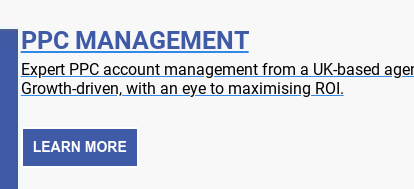Irrespective of whether you’re setting up your first Google Ads campaign or trying to optimise a roster of 16+ high-performance accounts, you’ll want to give this one a read.

As you’re no doubt aware, Google will sunset expanded text ads on the 30th of June 2022. This means you’ll no longer be able to create (or update) the classic, three-headline Google ads we’ve all been writing for the past 6 years.
Instead, we’ll all be forced to start creating responsive search ads – designed to “put machine learning into the hands of every advertiser” (source: Google). These ads mark a radical departure from the norm; you’re asked to input between 2 and 15 headlines (up to 30 characters each), plus 2 to 4 descriptions (up to 90 characters a piece).
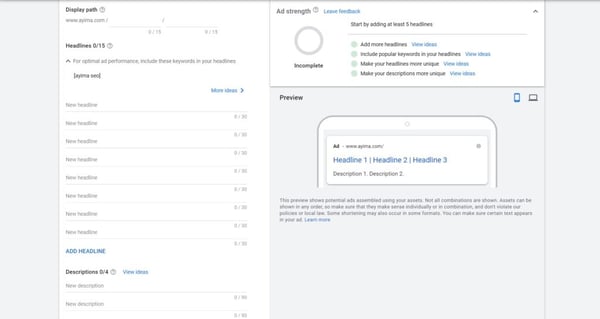
Google will then trial different combinations of your ad assets until it finds a “winning formula” of 2-3 headlines, 2 descriptions and whatever sitelinks or extensions you associate with your campaign.
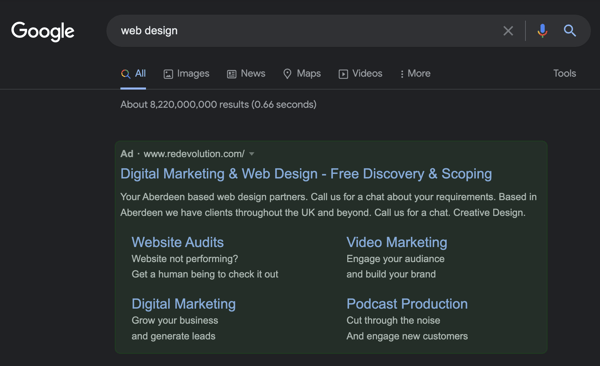
For advertisers familiar with the old approach, there are a couple of obvious problems: Firstly, you’ll have much less control over your messaging.Google gives every responsive search ad a “strength” score that will impact ad visibility and your per-click bid prices.
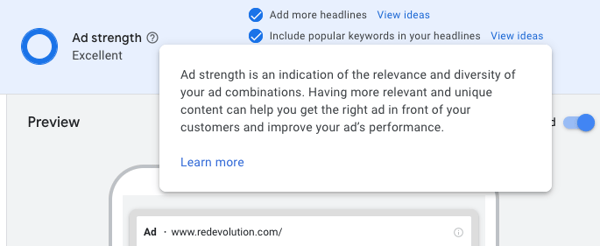
To get a good or excellent ad strength, you’ll need to input at least 11 unique headlines which google can and will display in any order as part of its all-consuming (but somewhat misguided) attempt to find the top-performing combination of your advertising assets.
You can ‘pin’ one or more headlines in place so that you can create semi-coherent messaging. But doing so drops your ad strength score so you’ve got no real choice but to accept that Google is going to scramble up and serve three random headlines that probably won’t make much sense in isolation.
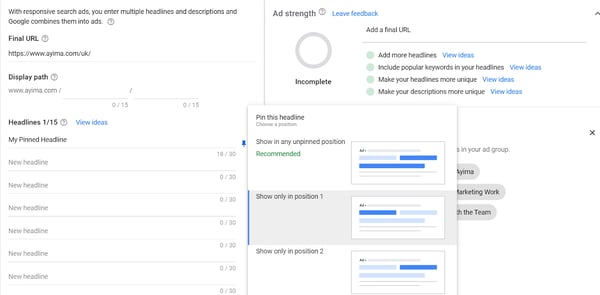
After all, Google’s “machine learning” algorithm is mainly relying on brute force to collect it’s first tranches of data and there’s no real way to write 11+ unique headlines that:
- Work well in any order
- Tell a compelling story
- Feature a good spread of your target keywords
We’re going to be serving up headline soup, and we have to accept that your target audience will be served some unintentionally-hilarious nonsense while Google’s working out how to arrange your assets for maximum engagement.
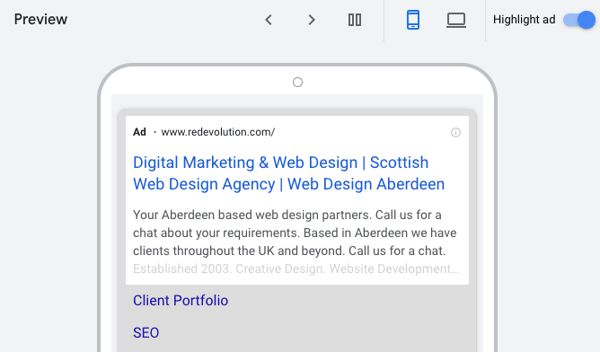
Worse still, your favourite headlines probably won’t see the light of day. But it’s not all doom and gloom. After several months of non-stop experimentation, we’ve come up with a selection of golden rules that should help you write and publish effective responsive search ads that are capable of driving a good amount of relevant traffic to your site.
Is It Really Possible To Write Effective Responsive Search Ads?
First things first, we want to stress that it is definitely possible to write impactful and effective responsive search ads. It can be something of a learning curve, but studies show that a strong and well-written responsive search ad can earn 4x the impressions of a traditional expanded search ad – and generate much better CTRs to boot (source: Optmyzr).
It’ll take time for the algorithm to work out how it should be combining headlines. But once it’s joined the dots, you can and will enjoy good performance across your ad catalogue.
Taking Google’s optimism about automation at face value, it’s also worth noting that writing responsive search ads will force you to experiment with bold new headlines that wouldn’t have made the cut if you were still restricted to three 30-line headlines.
While racking your brain for that all-important 11th USP, you may just stumble on a fantastic turn-of-phrase that lets you frame your product or offering in a brand new way. Necessity is the mother of invention, as they say.
And in real terms, we’ve got no choice. Google’s slow march towards a totally-automated ad platform is all-but inevitable at this point so we may as well embrace the challenge, and try to create effective responsive search ads instead of mourning the (substantial) advantages of the older, expanded text ad format.
Ready to dive in? Let’s go!

Focus On Highlighting Tangible Benefits
Given that they can now appear in any order, you want to make sure that each and every one of your 11+ headlines are capable of engaging your target audience. You don’t have the space to tell a complex story or showcase the full range of features associated with a given product/offering, so it’s best to return to everyone’s favourite marketing truism: “always focus on the benefits”.
According to Google, the agency in charge of Mitsubushi’s Thai advertising campaign tried stressing the comfortable nature of the manufacturer’s 7-seaters in a responsive text ad, and found that it actually increased conversions by 150% (source: Google).
In our own experiments, we’ve found that it also helps to focus on tangible benefits that can be articulated quickly. Things like “gives you hours of time back” or “get those all-important leads'' are sure to get people clicking, and they’re probably eye-catching enough to garner interest out of context, which is important if you can’t be sure how Google will arrange your headlines.
Make A Fuss About Important Stats
When you have very little space, need to outcompete the ads surrounding your assets and don’t have much control over your messaging, headline stats are a great way to grab people’s attention and generate clicks
If your product is 30% more efficient than your closest competitors, make sure you’re shouting about it in your headlines. If your service decreases the time taken to achieve outline planning permission by 10% or eliminates unnecessary project delays in 99% of cases, please make sure you’re giving those stats space to breathe
And if you don’t have useful or interesting stats to hand, it’s probably time to start surveying happy customers. A tool like Google Surveys will let you put together a quick questionnaire that generates statistically significant data in no time, and you can use any insights to enrich your Google ads from here on out.
Don’t Pin Too Many Headlines
Deliberately ceding control of your messaging to a machine learning algorithm is anathema to most marketers, but it may pay off when writing responsive search ads.
In a recent study published by Optmyzr, experts analysed 210,000 Responsive Search Ads across 4,341 user accounts and found that ads without any pinned headlines were significantly cheaper to run vs. variants with one or more pins.
They also found that pin-free ads had better CTRs, and that pinning one or more headlines significantly decreased impressions (ads with no pinned headlines got 214% more eyeballs).
But the same study also found that ads with no pinned headlines had lower conversion rates and a slightly lower ROAS (source: Optmyzr). This could just be due to the fact that they’re seen more often, but it’s worth recognising that there might be a delicate balance to be struck here.
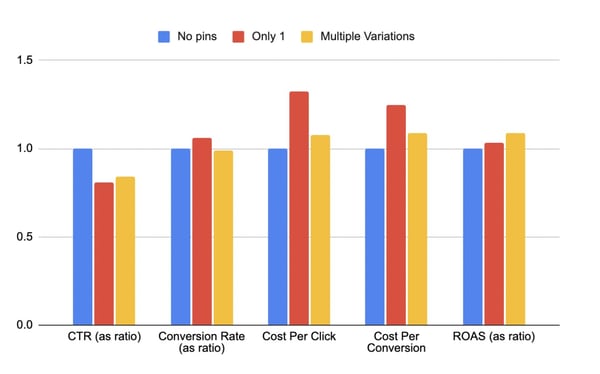
Pinning essential information in the first headline slot may give you enough control over your messaging to be worth the slight dip in impressions. Or you might find that pinning a disclaimer in the third headline slot is enough to deter an audience segment that’s less likely to convert (eg. people shopping on price).
Experiment. But above all, recognise that it’s generally best to be sparing with your pins. Google’s algorithm obviously does a daily good job of working out which headlines should be displayed concurrently - even if it does take a bit of time to get there - and the penalties for pinning ads can be quite severe.

Poach From Your Retiring Expanded Text Ads
Expanded text ads might be on their way out, but your library of older adverts still holds a wealth of valuable information. Navigate to your ads and order them by CTR to get a good idea of what resonates with your audience.
You’re now free to comb through your top-performing expanded text ads and poach any headlines that seem to be doing a good job of enticing your target audience. You can lift these headlines verbatim too: The headline count may be much larger for responsive text ads but you still get the same number of characters per heading so you can literally copy/paste good lines straight into your new ads.
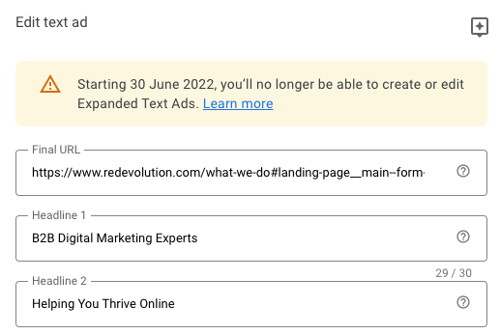 Talk about efficiency! We also recommend taking inspiration from top-performing descriptions too. If you’re running an older account, there’s a good chance that months or years of effort went into refining your old text ads. Recycling old content just means that you’re actively learning from all that work and you’ll have plenty of time to mull over new headlines once your responsive search ads are up and running.
Talk about efficiency! We also recommend taking inspiration from top-performing descriptions too. If you’re running an older account, there’s a good chance that months or years of effort went into refining your old text ads. Recycling old content just means that you’re actively learning from all that work and you’ll have plenty of time to mull over new headlines once your responsive search ads are up and running.
Struggling To Make The Transition?
We get it. The thought of trawling through campaigns, trying to think up some relevant USPs and write 15+ compelling headlines for every adgroup can be incredibly overwhelming. If you’re running up against that June 30th deadline and want someone else to take a look at your account, get in touch today.
We’re a full service digital agency with several PPC experts. We help B2B and B2C clients build killer PPC campaigns on a daily basis and we’d be more than happy to help you write new responsive search ads. We’re also happy to talk you through the process or offer some free advice so if you’re struggling with your ads account, don’t hesitate to reach out! We’re a friendly bunch and we enjoy helping people improve their paid marketing campaigns.
